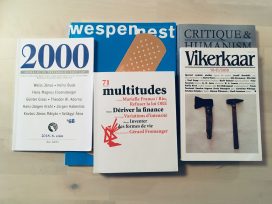Abstracts Multitudes 39 (2010)
Davy Cottet, Jon Bernat Zubiri-Rey et Patrick Sauvel
L’émergence du cognitariat face aux réformes universitaires en France
Cottet, Zubiri-Rey and Sauvel reframe the current reforms of the French university system within the process of adaptation to the knowledge economy and cognitive capitalism. They describe the emergence of a “cognitariat” around the university and call for a self reform of its mode of existence, of its production, of its mobilization, of its organization, and of its connections with other sectors of society in order to reverse its current trends of evolution.
Christopher Newfield
Structure et silence du cognitariat
The appropriation of abundant knowledge and the privatization of public and socially-created goods are the set of operations that cognitive capitalism exists to perform. This article looks at several aspects of this process. One is a systematic stratification within knowledge workers as a class or group. The second is the development of a structural basis for this stratification – proprietary knowledge – that gives the powerful system of financial capital a direct stake in stratifying knowledge workers. The third is the system of unequal universities and disciplines within universities that reproduces the labour hierarchy of knowledge work and that makes opposition psychologically difficult. Finally, there is the practice of “open innovation” in which a firm defines value-creation, not as the output of its own workforce but as the output of proprietary knowledge workers from a whole network of firms. This leads to a new version of the Ancien Regime‘s three estates: it needs to be confronted directly by knowledge workers in academia and industry alike.
Collectif Edu-Factory. La machine Edu-Factory.
Politique transnationale et institutions traductrices
“As once was the factory, so now is the university” Edu-factory started with this plain and apparently unproblematic statement – not to affirm but to interrogate it: how can edu-factory become a theoretical and political machine for the production of the common and just-in-time interventions during a time of crisis? Our challenge is to build up the common, which is neither public nor private, but an expression of autonomous yet mutually dependent bodies touching in social admixture.
Bourfouka. Des rives précaires de la recherche
On the assumption that a radical critique of academia can emerge from the ranks of the doctoral students, the Bourfouka collective makes two practical proposals. The first calls for the officialization of the legal status for the “cognitive temporary worker”, with a salary provided to students-researchers during the years they spend in MA, PhD and Post-Doc programmes, all the way to their first stable employment. The second calls for the emergence of collective authorship, anonymous names (like Bourfouka itself), which can be appropriated by researchers to publish the result of their work, thus undermining the undue, excessive and counter-productive inequality of the current signature-system. These two modest proposals pave the way for a radical restructuring of all research institutions.
Jon Solomon
La traduction comme méthode : l’Université néolibérale, lieu d’élaboration d’un nouveau putonghua (langue commune)
Apart from Shanghai and its rankings, East Asia can inspire a global reflection on the relationship between higher education and a global culture of the commons, in particular through the concept of putonghua, or “common language”, elaborated by the revolutionary Qu Qiubai (1899-1935). Resisting the misleadingly obvious nature of English as a universal language for the global university, a reflection about the nature, the wealth, the thickness and multifariousness of translation appears as highly strategic in any effort to pave new ways for university systems.
Michail Maiatsky
Pirojki à la bolognaise. Le miroir russe de l’université européenne
The current restructuring of the university systems in Western Europe and the recent evolutions of the Russian universities offer two mirror-images of a common trend. In one case, universities tend to become travel agencies; in the other they are corroded by the overall corruption which threatens post-Soviet society. In both cases, behind the multiple lines of flight opened by the academic experience, wealthy capitalism seems equally eager to impoverish its universities.
Artemy Magun
L’éducation supérieure dans la Russie post-soviétique et la crise mondiale des universities. Observations de l’intérieur
The situation of the Russian universities is ambiguous: the remnants of the old system are inert, isolationist and corrupt, but the newer alternatives merely formalize the neoliberal spirit. This situation exacerbates the same contradictions which affect universities worldwide: the opening of academia towards society is instrumentalized by neoliberal forces, while goals expressed in terms of quality or cultural level promote elitism and repression among students. This article suggests that a creative synthesis must be invented in order to escape from the current alternative.
Denis Giordano
Acrobaties face au désastre. Une houle d’espoir dans l’université italienne moribonde
Against the European push for normalized reforms of higher education, Italian activists, from October 2008 to spring 2009, have mobilized an “anomalous wave” of protests and resistance, revealing a rich potential for transversality and autonomy. Giordano attempts to measure simultaneously the inspiring nature of this movement, and the reasons for its inability to connect with larger sectors of the political dynamics.
Signataires anonymes. Pour une heureuse Réforme des Universités
Between echoes from the eighteenth century and returns from the future, between political manifesto and administrative blueprint, anonymous signatures sketch a list of 25 proposals which go beyond resisting bad reforms imposed by bad governments, in order to begin imagining a desirable university system.
Manuel DeLanda
Agencements versus totalités
How is it possible to acknowledge social complexity without separating society into micro and macro levels? According to Manuel Delanda, the solution resides in the Deleuzian concept of assemblage, theorized in this article. To bypass organicist theories, assemblage define relations from parts to whole as relations of exteriority, while being at the same time contingent and obligatory. The condition to succeed in this purpose is to redefine causality as a productive process, instead of being a mere linearity.
Alexander Neumann
L’expérience, le concept, l’imprévu. La sociologie de l’École de Francfort
Neumann focuses on the sociological heritage of the Frankfurt School, given the astonishing actuality of its main concepts. He underlines the originality of Oskar Negt’s thought, who abolishes the traditional, academic frontiers, throughout a life made of critical interventions, empirical research and fresh experiences. We have to conceive a new relationship between concept and experience in order to bridge the gap between a positivist sociology and an abstract philosophy.
Oskar Negt
L’espace public oppositionnel aujourd’hui
This text is based on the transcription of a conference which was held recently by Oskar Negt in France, within an ambiance of economical crisis and strikes. Instead of developing the philosophical dimensions of the concept of the Oppositional Public Sphere, he commented the themes and conditions that might help to redefine such an oppositional sphere today. Among the topics he underlined, we may quote the transformation of labour, the question of contemporary family forms and the corrosion of character under global capitalism.
Aldo Haesler et Michelle Dobré
Oskar et les Argonautes. Amphibolie de l’échange, hyperfétichisme et résistance ordinaire
This contribution proceeds from the myth of Jason as commented in Negt & Kluge’s Geschichte und Eigensinn (1981). Our argument plays on the assonance of two German verbs, “tauschen” and “täuschen” (to exchange and to trick) in order to examine the complex mechanism of the double fetishism in mercantile exchange. It questions the possibility of “ordinary resistance” based as well on everyday life tactics and “arts de faire”, as on the intrinsic anthropological proprieties of the exchange.
Lucia Sagradini
La plèbe entre dans la surface de jeu
In this article, the author seeks to render visible the issue of the reception of Oskar Negt’s thought and its flagship concept, the oppositional public sphere. How can politics be plebeian and how can be seen as a key player in the current democracy, despite their negative “animalty” or “savage” attributes ?
Anne Querrien
Affleurements de la subjectivité rebelle
Anne Querrien chose to cross a conceptual rediscovery of the issue of public space – from Habermas to Negt – with reflections on her own experience of fostering common life in urban space with the quest of how to live together. For this, she wanders between revolutionary movements and urban lifestyles in a close proximity with the thoughts of Negt.
Published 21 January 2010
Original in French
Contributed by Multitudes © Multitudes Eurozine
PDF/PRINTNewsletter
Subscribe to know what’s worth thinking about.



